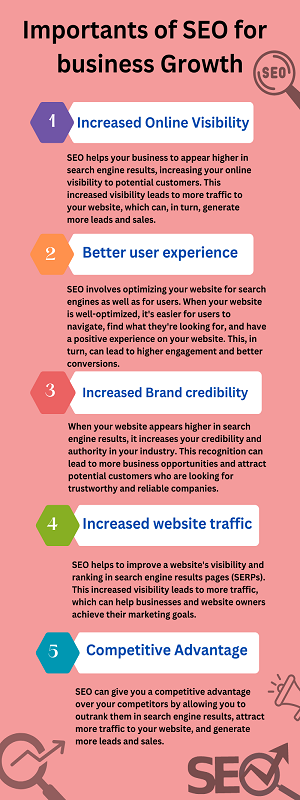Search Engine Optimization (SEO) is the practice of optimizing your website in a way that makes it more visible to search engines like Google, Bing, and Yahoo. SEO is critical to your website’s success because it helps you rank higher in search engine results pages (SERPs) and drives more traffic to your website. In this article, we will provide essential tips and strategies for optimizing your website for SEO, making it easier for beginners to get started.
SEO can have a significant impact on your business’s bottom line, as higher rankings can lead to more website traffic, more leads and conversions, and ultimately more revenue.
Overall, SEO is an essential part of any digital marketing strategy and should be a top priority for businesses looking to improve their online visibility and attract more customers.
Understand Your Audience and Keywords
The first step to optimizing your website for SEO is understanding your audience and the keywords they use to search for your products or services. Use tools like Google Analytics, Google Search Console, and keyword research tools to learn more about your audience’s behavior and the keywords they use to find your website. Understanding your audience and keywords is essential because it allows you to create content that is tailored to their needs and is more likely to rank higher in search engine results.
- Conduct Keyword Research: Use keyword research tools like Google Keyword Planner, SEMrush, and Ahrefs to find the keywords and phrases that your audience is searching for related to your products or services. These tools can help you identify the search volume, competition, and relevance of specific keywords.
- Analyze Your Competitors: Look at the keywords that your competitors are targeting and try to identify gaps in their content. This can help you create content that is more relevant to your audience and that will rank higher in search engine results.
- Identify Long-Tail Keywords: Long-tail keywords are phrases that are more specific and less competitive than broad keywords. They may have lower search volumes, but they also have a higher conversion rate because they are more relevant to the searcher’s intent. Identify long-tail keywords that are relevant to your audience and create content around those topics.
- Consider User Intent: Understand the intent behind the keywords that your audience is searching for. Are they looking for information, a specific product or service, or are they ready to make a purchase? This will help you create content that is tailored to their needs and will ultimately drive more traffic to your website.
- Create Buyer Personas: Creating buyer personas can help you understand your audience better and create content that is more relevant to their needs. A buyer persona is a fictional representation of your ideal customer, including their demographics, interests, and pain points.
Optimize Your Content
Use keywords naturally in your content, including in the title, meta description, and throughout the body of the content. But avoid overusing them as this can hurt your SEO ranking. Make sure your content is relevant, informative, and engaging for your audience.
Optimizing your content is essential for improving your website’s search engine ranking and driving traffic to your site. To optimize your content, you need to identify relevant keywords and phrases that your target audience is searching for, and include them naturally in your content. This will help search engines understand the topic of your content and rank it higher in search results. Additionally, you should ensure that your content is informative, engaging, and provides value to your audience. Finally, diversifying your content formats and regularly updating your content can also help you improve your SEO ranking and attract more traffic to your website.
Create Quality Content
Creating quality content is crucial to your website’s success because it helps you build authority and trust with your audience. Instead, try to use them naturally and in a way that makes sense to your readers. Quality content will also encourage other websites to link back to your site, which is an essential factor in SEO ranking.
The Role of Content in SEO
- Content is King: High-quality, relevant, and unique content is the backbone of SEO. Search engines prioritize websites with valuable content that satisfies the searcher’s intent. Your content should be informative, engaging, and useful to your target audience.
- Keyword Optimization: Including relevant keywords and phrases in your content can help your website rank higher in search engine results pages (SERPs). However, it’s essential to avoid keyword stuffing and use keywords naturally in your content.
- Content Formats: Diversifying your content formats can improve user experience and increase engagement on your website. You can use different content formats such as blog posts, infographics, videos, podcasts, and webinars to convey your message and reach a wider audience.
- Link Building: Creating valuable content can help you earn backlinks from other websites, which is a significant ranking factor in SEO. High-quality backlinks from authoritative websites can improve your website’s domain authority and increase your visibility in search engine results.
- Social Sharing: Creating shareable content can help you reach a wider audience through social media platforms. Social signals, such as likes, comments, and shares, can also indirectly impact your SEO ranking.
- Content Updates: Updating your content regularly can help you stay relevant and provide your audience with fresh information. Search engines favor websites that regularly update their content and reward them with higher rankings.
Optimize Your Website’s Structure
The structure of your website plays a significant role in SEO ranking. Use a simple URL structure that includes keywords and makes sense to your readers. Use header tags (H1, H2, H3) to structure your content and make it easier for search engines to understand the topic of your content.
Optimizing your website’s structure is essential to improving your website’s visibility in search engine results pages (SERPs) and providing a positive user experience.
- Use a Logical Navigation: Your website’s navigation should be clear, easy to use, and intuitive. Use descriptive labels for your navigation items and group related pages together.
- Create a Sitemap: A sitemap is a blueprint of your website that outlines the structure of your website and its pages. Search engines use sitemaps to understand the structure of your website and crawl it more efficiently.
- Employ Header Tags: Tags for the head (H1, H2, H3, etc.) aid in the organization of your content and make it simpler for search engines to comprehend your website’s structure. Use header tags to break up your content into sections and include your target keywords in them.
- Optimize Your URLs: Use descriptive and SEO-friendly URLs that include your target keywords. Avoid using generic URLs that don’t provide any information about the content of the page.
- Improve Site Speed: Website speed is an important ranking factor in SEO. Use a fast hosting provider, compress your images, minify your code, and enable caching to improve your website’s speed.
By optimizing your website’s structure, you can improve your website’s usability, search engine ranking, and ultimately, attract more traffic to your website.
Optimize Your Website’s Images
Images are a critical component of your website’s content, and they also play a role in SEO ranking. Alt tags help search engines understand what your images are about, and they also improve the accessibility of your website for users who are visually impaired. Optimized images can also help improve your website’s load speed, which is a significant factor in SEO ranking.
Build Backlinks
Backlinks are a critical factor in SEO ranking because they help search engines understand the authority and relevance of your website. Building backlinks can be done by creating quality content that other websites will want to link to, reaching out to other websites and asking for links, and guest posting on other websites.
Building backlinks is an essential aspect of search engine optimization (SEO). Search engines view backlinks as a vote of confidence in your content and website. Building backlinks can be done through various methods such as guest blogging, broken link building, and creating shareable content that naturally earns backlinks. It’s important to focus on building quality backlinks from authoritative websites relevant to your niche. Building backlinks takes time and effort, but it’s a crucial component of a successful SEO strategy.
Use Social Media
Social media is an excellent way to drive traffic to your website and improve your SEO ranking. Social media also helps you build backlinks because other websites may link to your social media profiles, which will ultimately link back to your website.
Social media platforms are an essential component of any effective SEO strategy. Social media can help drive traffic to your website, increase brand awareness, and improve your overall online presence. Here are some reasons why you should use social media as part of your SEO strategy:
- Increased Attraction: There are millions of active users on social media platforms like Facebook, Twitter, LinkedIn, and Instagram. By creating social media profiles for your business, you can increase your brand’s visibility and reach a wider audience.
- Social Signals: Social signals, such as likes, shares, comments, and followers, are indirect ranking factors in SEO. Search engines like Google and Bing use social signals to determine the relevance and popularity of your content.
- Backlinks: Social media platforms can also help you earn backlinks to your website. When you share your content on social media, it can be shared by others, increasing the chances of earning backlinks to your site.
- Customer Engagement: Social media provides a platform for customer engagement. You can use social media to interact with your customers, answer their questions, and build brand loyalty.
- Brand Awareness: Social media can help you build brand awareness by sharing your content with a wider audience. By creating compelling and engaging content, you can increase your reach and establish your brand as an authority in your industry.
Monitor Your Website’s Performance
Monitoring your website’s performance is crucial to your SEO success. Use tools like Google Analytics and Google Search Console to monitor your website’s traffic, ranking, and overall performance. Monitoring your website’s performance will help you identify areas where you can improve and adjust your SEO strategy accordingly.
Conclusion
SEO can be overwhelming for beginners, but it’s an essential part of your website’s success. Understanding your audience, creating quality content, optimizing your website’s structure and images, building backlinks, using social media, and monitoring your website’s performance are all critical factors in SEO ranking.
Faq’s
- Why is SEO important?
SEO is essential for businesses that want to increase their online presence and attract more traffic to their website. By optimizing your website, you can improve its visibility in search engines, drive more traffic, and ultimately, generate more leads and sales.
- What are keywords?
Keywords are words or phrases that people use to search for information, products, or services on search engines. Identifying the relevant keywords for your business and optimizing your website for those keywords can help improve your website’s ranking in search engine results.
- What is on-page optimization?
On-page optimization refers to the optimization of elements on your website, such as content, HTML tags, images, and meta descriptions, to improve its ranking in search engine results.
- What is off-page optimization?
Off-page optimization refers to the optimization of external factors that impact your website’s ranking, such as backlinks from other websites, social media signals, and online directories.
- What is domain authority?
Domain authority is a metric developed by Moz that measures the overall strength and authority of your website. A higher domain authority indicates that your website is more likely to rank higher in search engine results.

